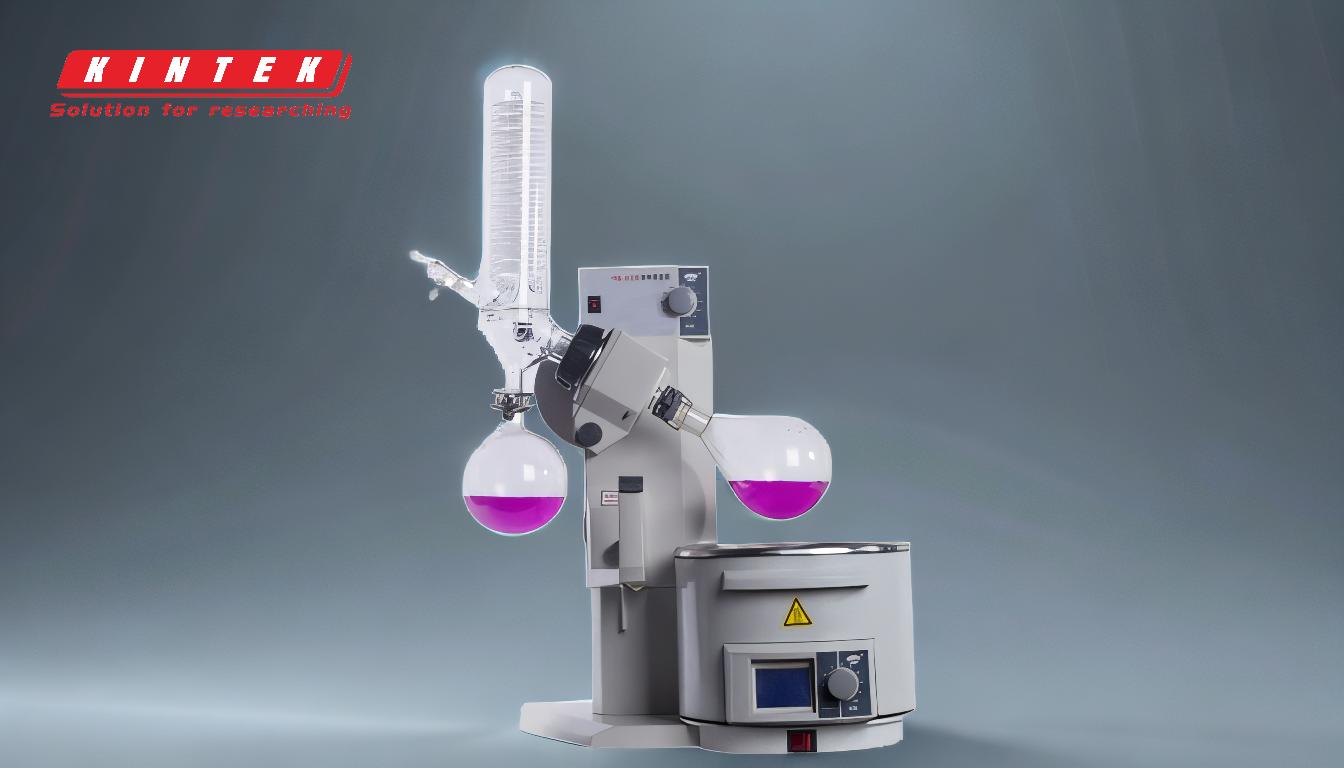The vacuum in a rotary evaporator is critical because it lowers the boiling point of the solvent, enabling efficient separation of the solvent from the compound of interest at lower temperatures. This process prevents thermal degradation of sensitive compounds, enhances distillation capacity, and ensures the purity of the extracted solvents by preventing contamination from air. The vacuum system, connected to the evaporation chamber and condenser, facilitates the smooth transfer of solvent vapor, making the entire process faster and more efficient. Additionally, the vacuum allows the continuous feed system to operate effectively, ensuring consistent performance throughout the evaporation process.
Key Points Explained:

-
Lowering the Boiling Point of Solvents
- The vacuum reduces the pressure inside the rotary evaporator, which directly lowers the boiling point of the solvent.
- This enables evaporation to occur at much lower temperatures, which is particularly beneficial for heat-sensitive compounds that might degrade at higher temperatures.
- By operating at lower temperatures, the process becomes gentler on both the equipment and the compounds being processed.
-
Preventing Thermal Degradation
- Many compounds, especially in pharmaceutical and biochemical applications, are sensitive to high temperatures.
- The vacuum ensures that solvents can be evaporated without exposing these compounds to excessive heat, preserving their integrity and preventing unwanted chemical reactions or decomposition.
-
Enhancing Distillation Efficiency
- The vacuum system accelerates the evaporation process by creating a low-pressure environment, which speeds up the transition of the solvent from liquid to vapor.
- This efficiency is crucial for large-scale operations or when working with solvents that have high boiling points under normal conditions.
-
Maintaining Solvent Purity
- The vacuum prevents air from entering the system, which could introduce contaminants or react with the solvents or compounds.
- This ensures that the extracted solvents remain pure and uncontaminated, which is essential for applications requiring high-purity results, such as in analytical chemistry or pharmaceutical production.
-
Facilitating Continuous Operation
- The vacuum system supports the continuous feed mechanism of the rotary evaporator, allowing for uninterrupted operation.
- This is particularly important in industrial settings where large volumes of solvent need to be processed efficiently and consistently.
-
Connecting the Evaporation Chamber and Condenser
- The vacuum system ensures smooth transfer of solvent vapor from the evaporation chamber to the condenser.
- This seamless transition is vital for maintaining the efficiency of the distillation process and preventing loss of solvent or compound.
-
Reducing Energy Consumption
- By enabling evaporation at lower temperatures, the vacuum system reduces the energy required to heat the solvent.
- This makes the process more energy-efficient and cost-effective, especially in large-scale or continuous operations.
-
System Pressure and Boiling Point Relationship
- The vacuum system allows precise control over the internal pressure, which in turn controls the boiling point of the solvent.
- This adjustability ensures that the process can be optimized for different solvents and compounds, making the rotary evaporator a versatile tool in various applications.
In summary, the vacuum in a rotary evaporator is indispensable for achieving efficient, gentle, and precise solvent separation. It ensures the process is faster, more energy-efficient, and suitable for handling sensitive compounds, making it a cornerstone of modern laboratory and industrial distillation processes.
Summary Table:
| Key Benefits of Vacuum in Rotary Evaporators | Explanation |
|---|---|
| Lower Boiling Points | Reduces pressure to enable evaporation at lower temperatures, ideal for heat-sensitive compounds. |
| Prevents Thermal Degradation | Protects sensitive compounds from high temperatures, preserving their integrity. |
| Enhances Distillation Efficiency | Speeds up solvent evaporation, crucial for large-scale operations. |
| Maintains Solvent Purity | Prevents air contamination, ensuring high-purity results. |
| Facilitates Continuous Operation | Supports uninterrupted processing, essential for industrial applications. |
| Connects Evaporation Chamber & Condenser | Ensures smooth solvent vapor transfer for efficient distillation. |
| Reduces Energy Consumption | Lowers energy requirements by operating at reduced temperatures. |
| Adjustable System Pressure | Allows precise control for optimizing processes across various solvents and compounds. |
Learn how a vacuum rotary evaporator can optimize your lab processes—contact our experts today!









